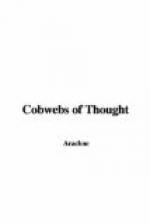“The Genuine text of Shakespeare,” October
number of the “National Review, 1903,”
“it was utterly impossible for that soul to
perform it,” or it might be added, to cast it
aside. He was betrayed by the apparition “into
consequences as deep as those into which Macbeth was
betrayed by the instruments of darkness—the
witches.” We cannot reason about Maeterlinck’s
thought that if expressed “would have arrested
all the forces of murder” because we do not
know what the thought was, nor can any one gauge or
estimate rightly the power of Hamlet’s soul to
conquer external events, without taking into careful
account that the Vision from another world came to
Hamlet, when he was outraged at the re-marriage of
his mother and full of emotion that the sudden death
of his father called forth in his meditative mind.[4]
But Maeterlinck never refers to anything of this sort.
He does not seem to realise what the effects of the
vision must have been on a complicated character—on
“a great gentleman in whom the courtier’s,
scholar’s eye, tongue, sword, were all united.”
Hamlet was not an example of the normal type
of the irresolute man—but the mandate laid
upon his nature, it could not perform. The vision
was his destiny—for Destiny lay in the nature
of the mandate, as well as the nature of the man,
and unhappiness was inevitable; yet Maeterlinck says,
“No tragedy is inevitable, the wise man can
be superior to all circumstances by the initiative
of the soul. To be able to curb the blind force
of instinct is to be able to curb external destiny.”
Did not Hamlet curb his instincts of love for Ophelia,
and love for books and philosophy, under pressure of
the great commandment laid upon him? He could
not curb the power of his intellect—it
was too subtle and supreme, but he concealed all else.
Yet Hamlet could not escape his Destiny, by curbing
his instincts. The initiative of his soul worked
against the duty he had to perform. And it was
through his “simple, tender, good,” thoughts
of, and love for his father that he kept to his task,
and could not “withstand his complicated destiny.”
Maeterlinck is surely wrong, too, in saying Hamlet
was moved by a fanatical impulse to revenge for he
spent his life in weighing pros, and cons,
and in combating the idea that he must fulfil the
duty laid upon him. So unfanatical was he that
he even doubted at times whether the apparition was
his father’s spirit. But supposing there
had been “one brave soul to cry out the truth”
(Maeterlinck does not say what the truth was); we will
suppose that Hamlet had resolved to forgive fully
and generously, would he, then, have gained the fortitude
and serenity, which Maeterlinck evidently means by
inner happiness? Not if he kept a shred of his
inner nature. Hamlet “saw no course clear
enough to satisfy his understanding.” Could
such a nature be serene? But was it unwise?
Judicious, wise, and witty when at ease; he could
not escape the dark moods that made him indifferent
to the visible world.




